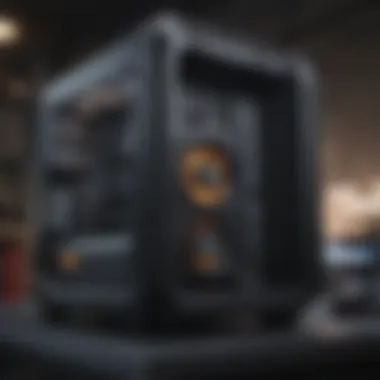Elevated Performance Insights for 8K Gaming PCs


Intro
As the digital playground continues to evolve, gamers are on the lookout for the next big leap in their interactive experiences. Enter the realm of 8K gaming PCs, a groundbreaking advancement that promises a level of detail and clarity that was once the stuff of dreams. With the rapid pace of technology, what does it take to build a machine that can deliver such a feast for the eyes?
This article aims to guide you through the essential components necessary for a powerful 8K gaming rig, the software that breathes life into these systems, and how this cutting-edge technology will shape the future of gaming. We will also address performance optimization tips, the cost intricacies involved, and delve into why 8K gaming stands out in the ever-crowded landscape of entertainment.
What to Expect
- Essential Components: Break down the hardware needed for 8K gaming.
- Software Ecosystem: Explore the programs and games that can harness 8K technology.
- Performance Optimization: Tips for squeezing out maximum efficiency from your build.
- Cost Considerations: A look into the financial aspects of going 8K.
- Broader Context: How 8K gaming fits into the larger entertainment industry.
As we embark on this journey, gear up to untangle the complexities of building an 8K gaming machine, and see what it really means for the future of gaming.
Understanding 8K Gaming
The landscape of gaming is continually shifting, and the push for more detailed visuals has never been as pronounced as it is today. It's no surprise that 8K gaming has emerged as a significant topic of discussion among gamers and tech enthusiasts alike. Understanding the intricacies of 8K is not merely a luxury; it's becoming essential for anyone serious about pushing the boundaries of their gaming experience. Let's dive deeper into what makes 8K resolution a game changer.
Defining 8K Resolution
To put it simply, 8K resolution refers to a display resolution of approximately 8000 pixels width-wise. Specifically, it usually means a resolution of 7680 x 4320 pixels. Now imagine each pixel representing a tiny dot on your screen; the sheer number of them in 8K compared to 4K (3840 x 2160 pixels) is astoundingly higher.
This spike in pixel count leads to sharper images and even more lifelike details. Whether in expansive landscapes of an open-world game or the realistic textures of a character's attire, the experience is jaw-dropping. Think about it this way: When gaming at resolutions like 1080p, many of those intricate details can easily be missed. However, at 8K, it feels like you’re truly walking through a digital world.
In practical terms, the increased resolution considerably enhances visual fidelity. It allows players to spot enemies hiding behind cover or catch subtle movements in the environment that could be overlooked in lower resolutions. For competitive gamers, this could offer a significant edge.
The Rise of 8K in Gaming
The rise of 8K in gaming is tied closely with technological advancements. With the continuous improvements in display technology, from televisions to PC monitors, more users are becoming aware of what 8K has to offer. Manufacturers are scrambling to meet this growing demand, leading to more options for gamers.
Noteworthy is the fact that next-generation consoles like the PlayStation 5 and Xbox Series X are already hinting at supporting 8K gaming. This not only shows a commitment to pushing graphical limits but hints at a broader trend where developers start creating games with 8K in mind.
However, it’s not all smooth sailing. The challenge remains that not every game can run in 8K mode, and those that can often require significant hardware capability, not to mention the hefty price tag associated with such setups. Gamers need to weigh the pros and cons of investing in high-end components just to enjoy this cutting-edge resolution.
"8K gaming offers a glimpse into the future, where pixel density heightens realism and immersion beyond what many thought possible."
Components of an 8K Gaming PC
Building an 8K gaming PC is no walk in the park; it requires a keen understanding of various components that work harmoniously to deliver an unmatched gaming experience. In a landscape where every pixel matters, the performance of your rig hinges greatly on the selection and quality of these components. A carefully curated setup ensures smooth frame rates, stunning visuals, and overall system reliability, making it a fundamental aspect for anyone venturing into the world of 8K gaming.
Processor Requirements
The heart of any good gaming PC is its processor. To handle the sheer data load from an 8K source, a top-notch processor is non-negotiable. You’re looking at at least an Intel Core i9 or AMD Ryzen 9 series to do the heavy lifting. These processors come equipped with multiple cores and threads, enabling them to simultaneously handle tasks such as game physics, AI computations, and background processes. The difference between a middling processor and a high-end beast can be as stark as day and night, affecting not just performance, but also your enjoyment of intensely detailed game worlds. The key is to strike a balance: while you don’t have to go overboard, skimping on the CPU could bottleneck your graphics card, making those 8K textures look subpar.
Graphics Cards for 8K Gaming
Next up, the graphics card. This is where the magic happens—turning code into stunning visuals. The latest iterations of the NVIDIA GeForce RTX 3090 or the AMD Radeon RX 6900 XT are what you’re after. These powerhouses can churn out 8K resolution without breaking a sweat, but remember that they rely heavily on the rest of your build.


"A great graphics card is the bridge between your dreams and the gaming reality."
You need the right combination of memory and speed in your graphics card to push those vibrant 8K textures. Make sure to also consider VRAM—when you’re running games at incredibly high resolutions, it gives you that little extra breathing room needed to keep everything smooth and crisp.
Memory and Storage Considerations
When it comes to memory, aim for no less than 32GB of RAM. At 8K, game assets and textures demand an enormous amount of data to be processed swiftly, which is why having ample memory is crucial. DDR4 or DDR5 options provide the speed necessary for a seamless experience, so make sure your choice is future-proof.
Storage is another aspect that can’t be ignored. Solid State Drives (SSDs) have dramatically reduced load times and improved overall system responsiveness. M.2 NVMe SSDs are particularly recommended as they offer lightning-fast data transfer speeds that are essential for accessing your 8K game files. Consider the total size as well; you don't want to be constantly juggling storage or running out of space for your gaming library.
Motherboard Specifications
A well-chosen motherboard is essential as it serves as the backbone of your entire setup. You’ll want to focus on compatibility with your processor and graphics card, as well as expansion options. Look for a motherboard that supports PCIe 4.0 to take advantage of the latest technologies and faster data lanes. Features such as multiple M.2 slots for SSDs, strong power delivery for overclocking, and robust cooling solutions are paramount to ensuring reliability under load.
Cooling Solutions for Optimal Performance
With performance comes heat, and your 8K gaming PC will generate plenty of it. Investing in an effective cooling solution is vital to maintain good temperatures and prolong component lifespan. Consider a custom liquid cooling system or high-quality air coolers to keep your CPU and GPU from overheating.
In addition, case airflow plays a significant role, so ensure your setup allows for adequate fan placement and air circulation. The combination of proper cooling, well-chosen components, and an efficient case layout will fortify your system for peak performance.
Software and Game Compatibility
As we step into the enthralling realm of 8K gaming, the significance of software and game compatibility cannot be overstated. It’s not merely a matter of having powerful hardware; the ability for that hardware to seamlessly interact with various software components is vital for achieving that breathtaking gaming experience. Think of the perfect symphony; it takes more than just exceptional musicians—it requires the right conductor, the sheet music, and the audience to make everything feel harmonious. In a similar way, your gaming PC is just a set of tools without the proper software to bring it all together.
Operating System Capabilities
When diving into 8K gaming, your operating system is the backbone of your gaming experience. Modern OS, such as Windows 10 and the forthcoming Windows 11, have made significant strides in supporting high-resolution environments. They equip users with tools to manage settings and performance without evoking the dread of performance hiccups.
Compatibility with 8K graphics means having system requirements that can handle the load. A solid 64-bit OS is a must-have since it can handle more RAM and advanced functionalities that high-end games demand. Also, features like DirectX 12 enhance graphics and processing capabilities further. This is where many gamers can fall into a trap; you might have a high-end PC, but if the OS can't keep pace, you're left staring at a lagging screen.
Drivers and Optimization Tools
Drivers play a crucial role in bridging the gap between the hardware and software. By keeping your drivers up to date, you ensure that your graphics card performs optimally with the latest gaming titles. Many users overlook this aspect; out of sight often translates to out of mind, and an outdated driver can result in performance loss.
Optimization tools, such as NVIDIA GeForce Experience or AMD's Radeon Software, act as your personal assistant, tweaking settings so you can enjoy the polished version of a game rather than a choppy rendition of it. They offer tips on enhancing performance and allow for quick configuration changes, perfect for gamers looking to get right into the action with minimal fuss.
Game Titles Supporting 8K Resolution
Not every game will jump onto the 8K bandwagon, at least not right away. However, giants in the gaming landscape such as Cyberpunk 2077, Call of Duty: Modern Warfare, and Project X are beginning to roll out optimizations for 8K. These titles not only push pixel counts to stratospheric levels but also incorporate features like ray tracing, which adds another layer of depth to visual fidelity.
Here's a short list of notable titles supporting 8K:
- Cyberpunk 2077
- Control
- Doom Eternal
- Resident Evil Village
- Watch Dogs: Legion
Performance Considerations


In the realm of 8K gaming, performance considerations emerge as a crucial focal point. Gamers often pursue the finest visual experiences, yet the path to 8K is not without its challenges. Ramping up resolution to this level demands a harmonious blend of high-end components, optimized software, and careful tuning of settings. It’s not just about having the highest specs; it’s about how they come together to deliver an immersive experience.
Frame Rates and Refresh Rates in 8K
Frame rates and refresh rates are two sides of the same coin when discussing high-resolution gaming. Frame rate typically measures how many frames per second (FPS) a gaming system can produce, while refresh rate refers to how often your display updates its image. In an 8K context, hitting higher frame rates is essential, yet so many gamers struggle with it because of the sheer amount of data being processed.
For instance, shooting for 60 FPS at 8K isn’t just about a powerful GPU. It entails tweaking settings and sometimes settling for compromises in other visual elements to hit that sweet spot. If you want to truly enjoy smooth gameplay, keep an eye on your monitor’s refresh rate. A setup with a 120Hz display can make a world of difference, as long as your system is up to snuff.
Remember: Achieving harmonious frame rates at 8K is akin to balancing a finely tuned race car. Every element must work together."
Visual Fidelity vs. Performance
This age-old debate finds a new battleground in 8K gaming. On one hand, there’s the irresistible pull of amazing graphics and visual fidelity, while on the other, the need for performance cannot be ignored. Gamers may find themselves at a crossroads: how much detail can you give up to obtain fluid gameplay?
For example, those mesmerizing ray-traced reflections in games can turn heads, but they also suck up resources faster than you can say "frame drop". Prioritizing graphical settings can lead to a richer atmosphere, but often gamers end up toggling things like shadow quality or texture resolution down. It forces a choice—choose eye candy or choose smooth gameplay, but balance is key.
Latency Issues in High-Resolution Gaming
When gaming at 8K, latency becomes a significant player in the performance equation. While most gamers are aware of the impact of latency in terms of response times, fewer consider how soaring resolutions can exacerbate the issue.
In high-resolution gaming, input lag can manifest more prominently. A top-tier gaming mouse could still feel unresponsive if your system struggles to convey inputs quickly enough due to high resolutions. Network latency also enters the fray, especially if you’re venturing into online gaming. When every millisecond counts, settings limitations might result in frustration instead of finesse.
To mitigate these pitfalls, gamers can experiment with lower resolutions temporarily, ensuring response time stays sharp before ramping back up to the glorious 8K spectacle. Adjusting settings to optimize bandwidth and system performance can also bear fruit in refining overall gameplay experience in this intricate dance between high resolution and reactivity.
In summary, embracing and understanding the performance considerations in 8K gaming is paramount. From frame rates and visual fidelity to latency concerns, each element plays a vital role in shaping the immersive experience that gamers strive for.
Cost Analysis of 8K Gaming PCs
In the realm of high-end gaming, the cost aspect often takes center stage. Constructing an 8K gaming PC represents not just a commitment to a dazzling visual experience but also a substantial financial undertaking. Understanding the specifics behind the numbers is crucial for any serious gamer or enthusiast looking to invest in such technology. Evaluating the financial components of an 8K gaming PC leads us to understand the overall cost implications, which can significantly influence one’s decisions.
Evaluating Component Costs
The heart of any gaming PC lies in its components, and for 8K gaming, these need to be top-notch. Each part plays a pivotal role when it comes to achieving the desired performance at ultra-high resolutions.
- Processor: The CPU must be capable of handling immense data flow. High-performance chips such as the Intel Core i9-12900K and AMD Ryzen 9 5950X typically cost a pretty penny, often ranging in the $500 to $800 bracket.
- Graphics Card: This is where costs can really soar. A top-tier GPU like the NVIDIA GeForce RTX 4090 can cost well over $1,500. However, it's not just about the price, but also about raw performance. The better the graphics card, the more fluid the gaming experience at 8K.
- Memory and Storage: Faster RAM (32GB or higher) alongside SSDs for storage can add another $300 to $500. These components not only speed up load times but also positively impact frame rates and system responsiveness.
Each component contributes significantly to the overall bill. In many cases, gamers might have to part ways with $3,000 or more for a PC that can truly deliver 8K graphics without breaking a sweat.
Budgeting for Additional Equipment
While the internal components form the core of your 8K gaming rig, there’s a universe of additional equipment that can’t be ignored in your budget.
- Monitor: The right display is essential. An 8K monitor may set you back anywhere from $1,500 to $3,000. Choosing a quality screen that supports high refresh rates is crucial, especially for fast-paced games.
- Peripherals: High-end gaming peripherals, such as mechanical keyboards or precision mice, can add another couple hundred bucks to your budget. Comfort and performance are non-negotiable here.
- Cooling Solutions: Adequate cooling is paramount for maintaining performance during those heavy gaming sessions. Custom liquid cooling setups can cost anywhere from $200 to $600. Keeping your rig cool will not only enhance performance but also prolong the life of your components.
When tallying everything up, budgeting for additional equipment becomes just as essential as the internal build itself.


Price-to-Performance Ratios
Understanding price-to-performance ratios can help demystify whether an investment in 8K gaming is indeed worthwhile. This is where many gamers find themselves in a tricky situation.
- Performance Expectations: If you’re looking for 8K gaming at consistent frame rates above 60 FPS, you’re going to want high-end components that are more expensive. On the other hand, if you settle for lower performance, akin to 30 FPS, you might not need to spend as much.
- Marking Value: The price might be high, but so is the immersive experience. Gamers need to consider whether the purchase aligns with their gaming habits. If someone only plays casually, they may not find value in maxing out their gaming rig.
- Comparison with Lower Resolutions: Finally, one cannot help but compare. With gaming rigs capable of running at 4K significantly lower in cost, it’s essential to analyze whether the extra investment for 8K holds tangible benefits for your gaming experience.
In summary, while 8K gaming offers an ultra-realistic experience, the cost analysis reveals that it’s a significant investment—not just in terms of individual components but also in peripheral equipment and the expected performance. A rational approach to the budget will guide enthusiasts in making informed choices, ensuring a satisfying gaming journey without emptying the wallet.
The Future of Gaming
In the ever-evolving world of technology, the trajectory of gaming is marked by leaps and bounds, particularly with the advent of higher resolution displays. The emergence of 8K gaming PCs is not just a fleeting trend; it heralds a significant shift in how games are experienced. As gamers seek more immersive and visually stunning experiences, the importance of understanding the future of gaming cannot be overstated. Looking ahead, it's clear that several elements will shape this landscape, namely growth predictions, developmental impacts, and the integration of related technologies.
Predictions for 8K Gaming Growth
With each passing year, the growing anticipation for 8K gaming becomes more palpable. Analysts predict that the market for 8K-ready devices could see substantial growth as hardware continues to adapt and content becomes available. The arrival of faster internet connections, like fiber optics, is paving the way for larger file sizes and the ability to stream ultra-high-definition content with minimal lag. Here are some key factors influencing this growth:
- Investment in Technology: Major tech companies are committing resources to develop the next generation of GPUs and displays capable of handling 8K resolutions effectively.
- Consumer Demand: As gamers become more aware of what 8K can deliver, the desire for better resolution and performance will likely drive purchasing decisions.
- Content Production: Game developers and studios are starting to create titles specifically optimized for 8K, widening the reach of this technology.
Potential Impacts on Game Development
The rise of 8K gaming will start a ripple effect in game development. Traditional ways of creating games will be challenged, leading to new methodologies that prioritize graphics without compromising other essential aspects like gameplay and story.
- Artistic Innovation: Developers might push the boundaries of creativity, leading to richer worlds and intricate character designs, enhancing visual storytelling.
- Enhanced Resource Requirements: Game engines and development software will also evolve to meet the demands of 8K, meaning future titles might require more sophisticated programming.
- Team Collaboration: With remote work becoming more common, teams globally may collaborate on 8K projects, leading to diverse influences and innovations.
Integration with Other Technologies
The future of gaming doesn't exist in a vacuum; it’s interconnected with several emergent technologies. As 8K gaming appears on the horizon, several advanced technologies will blend with gaming experiences:
- Virtual Reality (VR): As VR technology becomes more accessible, the demand for higher resolution displays will grow. Combining 8K with VR could create unmatched immersive experiences.
- Augmented Reality (AR): As AR applications increase in gaming, the need for high-definition visuals will become even more significant.
- Artificial Intelligence (AI): For enhancing game responsiveness and dynamic environments, AI will begin playing a vital role, especially in managing the complexity of rendering at higher resolutions.
The future of gaming, particularly with 8K technology, offers a tantalizing glimpse at what’s to come—an integration of art, technology, and gameplay that elevates the player’s experience.
Closure
As we wrap up this exploration into the world of 8K gaming PCs, it’s clear that the journey toward building a high-performance gaming machine is filled with technological marvels and cutting-edge innovations. The discussion on the essential components, software, and performance considerations highlights the intricate relationship between hardware capabilities and gaming experiences.
Understanding the Importance: A well-thought-out conclusion sheds light on why all these elements matter. The demand for highly immersive and visually stunning experiences in gaming has never been higher. 8K gaming represents not just a numerical upgrade but also a fundamental shift in how gamers perceive their virtual environments. The clarity and detail available at 8K resolution provide a visual feast that enhances immersion, drawing players deeper into their favorite digital worlds.
Key Benefits: 8K gaming PCs can elevate your gameplay, promising smoother performance and stunning visuals. Achieving higher frame rates and lower latency can mean the difference between victory and defeat in competitive settings. The underlying technologies, like advanced GPUs and SSDs, not only boost gaming experiences but also enable lightning-fast load times and fluid animations. As gaming continues to evolve, investing in an 8K gaming PC ensures you remain at the forefront of this technological revolution, ready to embrace future titles designed to take advantage of what 8K offers.
Considerations to Keep in Mind: However, it is vital to weigh the costs against the benefits. Building or upgrading to an 8K gaming setup is no small feat. One must navigate the intricate balance of investing in powerful components while also considering your gaming habits and preferences.
In looking ahead, the future of gaming is bursting with potential. With advancements in graphics, processing capabilities, and even new technologies like virtual reality intersecting with 8K gaming, the possibilities seem endless. As we conclude this article, it serves as a testament to the ever-evolving landscape of both gaming and technology itself. 8K gaming is not merely about resolution; it's about how we connect, compete, and immerse ourselves in digital realms that push the boundaries of what's possible.
"In the world of gaming, clarity and detail are not just luxuries; they are necessary ingredients for a truly immersive experience."
Summarizing Key Points
To recap the discussions held throughout the article:
- 8K Resolution: With four times the pixels of 4K, it enhances detail and immersion in gaming.
- Components: High-end processors, graphics cards designed for 8K, ample memory, fast storage, and robust cooling solutions are essential to build an effective PC.
- Software Compatibility: Operating systems and drivers must be optimized for 8K to maximize performance.
- Performance Metrics: Frame rates and latency must be factored in to comprehend the gaming experience accurately.
- Cost Analysis: While the upfront investment can be hefty, understanding price-to-performance ratios assists in making informed choices.
Ultimately, embracing the capabilities of an 8K gaming PC is about enhancing your overall gaming experience. As the ecosystem surrounding high-resolution gaming continues to grow, those who invest now will likely find themselves ahead of the curve, experiencing games as they were meant to be seen.















